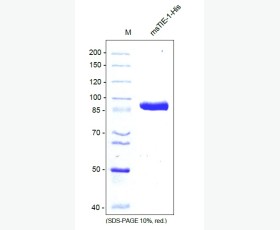Recombinant Mouse Endothelial Cell-Specific Molecule /Endocan/ESM-1
| Product name: | Recombinant Mouse Endothelial Cell-Specific Molecule /Endocan/ESM-1 |
| Source: | Human Cells |
| Purity: | Greater than 95% as determined by reducing SDS-PAGE. |
| Buffer Formulation: | Lyophilized from a 0.2 μm filtered solution of PBS, pH7.4. |
| Applications: | Applications:SDS-PAGE; WB; ELISA; IP. |
| Storage: | Avoid repeated freeze/thaw cycles. Store at 2-8 oC for one month. Aliquot and store at -80 oC for 12 months. |
| UOM: | 100ug/50ug/200ug/1mg/1g |
| Source | Human Cells |
| Description | Recombinant Mouse ESM-1 is produced by our Mammalian expression system and the target gene encoding Trp20-Arg184 is expressed with a 6His tag at the C-terminus. |
| Names | Endothelial cell-specific molecule 1, ESM-1, Esm1, Endocan |
| Accession # | Q9QYY7 |
| Formulation | Lyophilized from a 0.2 μm filtered solution of PBS, pH7.4. |
| Shipping |
The product is shipped at ambient temperature. |
| Reconstitution |
Always centrifuge tubes before opening. Do not mix by vortex or pipetting. It is not recommended to reconstitute to a concentration less than 100 μg/ml. Dissolve the lyophilized protein in ddH2O. Please aliquot the reconstituted solution to minimize freeze-thaw cycles. |
| Storage |
Lyophilized protein should be stored at < -20°C, though stable at room temperature for 3 weeks. Reconstituted protein solution can be stored at 4-7°C for 2-7 days. Aliquots of reconstituted samples are stable at < -20°C for 3 months. |
| Purity |
Greater than 95% as determined by reducing SDS-PAGE. |
| Endotoxin | Less than 0.1 ng/µg (1 IEU/µg) as determined by LAL test. |
| Amino Acid Sequence |
WSAKYAVDCPEHCDKTECRSSLRCKRTVLDDCGCCQVCAAGPGETCYRTVSGMDGVKCGPGLKCH FYSEEDDFGDEFGICKDCPYGTFGMECKETCNCQSGICDRVTGRCLDFPFFQYAAAKSPSRTSAS HTERDSASGDGNAVREEIGEGNAARPSVMKWLNPRVDHHHHHH
|
| Background | Endothelial cell-specific molecule–1 (ESM-1)—so-called endocan—is a novel endothelium derived soluble dermatan sulfate proteoglycan (PG) that is constitutively expressed by endothelial cells in lungs and kidneys and can be detected in human blood. It is encoded by the ESM1 gene. The expression of this gene is regulated by several cytokines and growth factors, such as vascular endothelial growth factor. Inflammatory cytokines, such as interleukin (IL)-1β and tumor necrosis factor (TNF)-α, stimulate the upregulation of endocan mRNA and the secretion of endocan from endothelial cells. The binding of circulating endocan to leukocyte ligand for ICAM-1—Lymphocyte Function-associated Antigen-1 (LFA-1) and to leukocyte ligand for VCAM-1—Very Late Antigen-4 (VLA-4) is important in leukocyte adhesion and interaction with activated endothelium. Endocan is a key player in the regulation of major processes such as cell adhesion in inflammatory disorders and tumor progression. |














